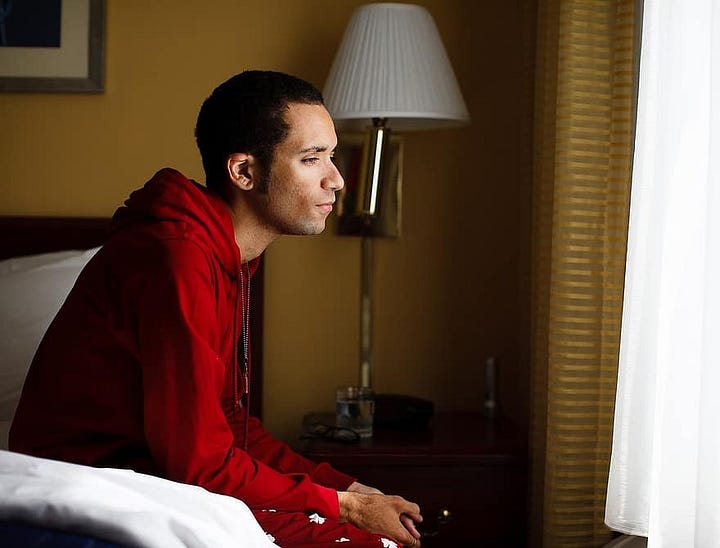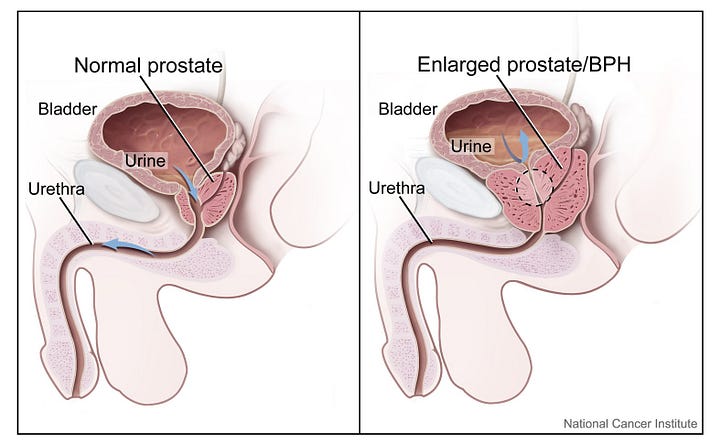
While working one morning in my room, I overheard a bit of the discussion of an elderly couple whom I knew quite well as they passed by my house. The elderly man was complaining to his wife about how he couldn’t catch enough sleep at night because he was urinating frequently, (“there really is no cause for alarm” I said to myself). But then, his wife asked about the drug he was using and I realized that there was a problem. As much as a lot of factors could be responsible for Baba’s frequent urination, one very common cause is BPH and is a common condition as men grow older. What is BPH? How do men get affected? These are some of the important questions I will be answering in this article. So please, fasten your seatbelt as I take you on this “tour” of BPH.
What is BPH?
BPH is an acronym for benign prostate hyperplasia, also called prostate gland enlargement. The prostate is part of the male reproductive system. It’s about the size of a walnut and weighs about an ounce. It is found below the bladder. It goes all the way around a tube called the urethra, which carries urine from the bladder out through the penis. Its main job is to make fluid in the semen. It undergoes two main growth periods as a man ages. The first occurs early in puberty, when the prostate doubles in size. The second phase of growth begins around age 25 and continues during most of a man’s life. BPH often occurs during the second growth phase.

As the prostate enlarges, it presses against the urethra and narrows it. The narrowing of the urethra obstructs free flow of urine thereby leading to urine retention. These urinary retention and narrowing of the urethra are the causes of the problems faced by people with BPH.
Is BPH cancerous?
No, BPH is not cancerous and it’s very common (present in over 1.5million people yearly in Nigeria) but BPH and cancer can occur together. The cause of BPH is really not known as one theory claims it is due to hormonal changes( i.e decrease in testosterone and increase estrogen as a man ages), another theory says it is due to a particular hormone (Dihydrosterone DHT) which increases as a man grows older, either of them may lead to rapid prostate cell growth.
What symptoms does it present?
Apart from the frequent urination which I mentioned earlier on, others include difficulty in urinating, difficulty in emptying the bladder, dribbling after urination etc. Risk of BPH also increases with age, family history, obesity, diabetes, as well as inactivity.
Is there a way out?
As I usually say if you are conversant with my write ups, the place of healthy living cannot be overemphasized even in BPH. As there is no sure way to prevent it but by losing weight and eating a healthy and well balanced diet, rich in fruits and vegetables to regulate hormone levels and reduction in prostate cell division. Peradventure you are a BPH patient, please limit alcohol and caffeine and avoid resisting the urge to urinate (also important for non-patient too)
Another useful piece of advice I will like to offer is this: please if you notice any urinary problem at all, even if your symptoms are not troublesome, please seek medical attention to rule out any possibility of any underlying issue so as to prevent any problem that will lead to total obstruction of the urinary tract.
Thank you very much for reading.
References
www.mayoclinic.org -Benign prostatic hyperplasia (BPH), symptoms and treatment
www.urologyhealth.org -Benign prostatic hyperplasia (BPH): symptoms and diagnosis
www.niddk.nih.gov Prostate enlargement (Benign prostatic hyperplasia)
www.healthline.com BPH: Causes, symptoms, diagnosis and treatment.
Comments
Post a Comment